Unit 1 Friendship Grammar课件
文档属性
| 名称 | Unit 1 Friendship Grammar课件 |
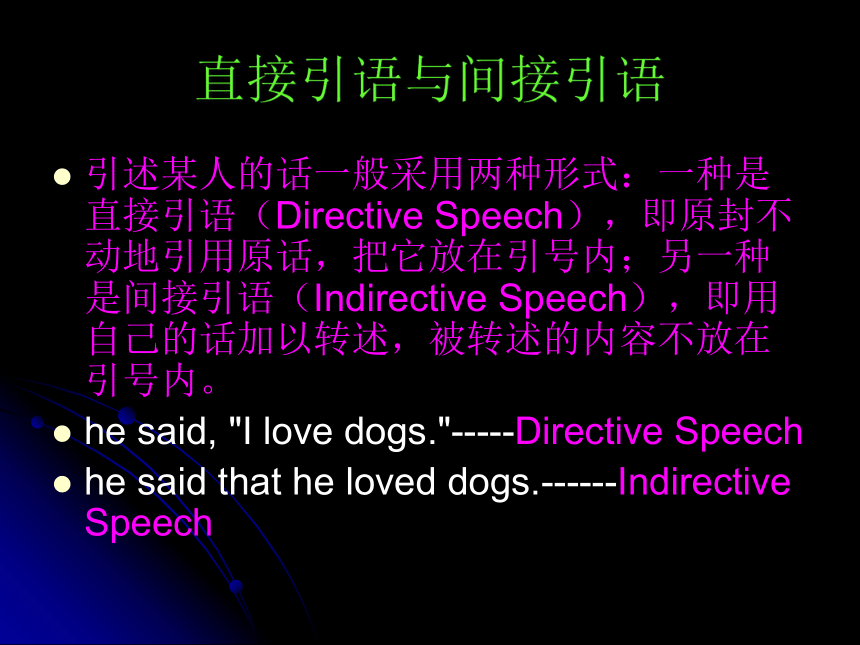
|
|
| 格式 | rar | ||
| 文件大小 | 40.2KB | ||
| 资源类型 | 教案 | ||
| 版本资源 | 人教版(新课程标准) | ||
| 科目 | 英语 | ||
| 更新时间 | 2011-09-16 00:00:00 | ||
图片预览

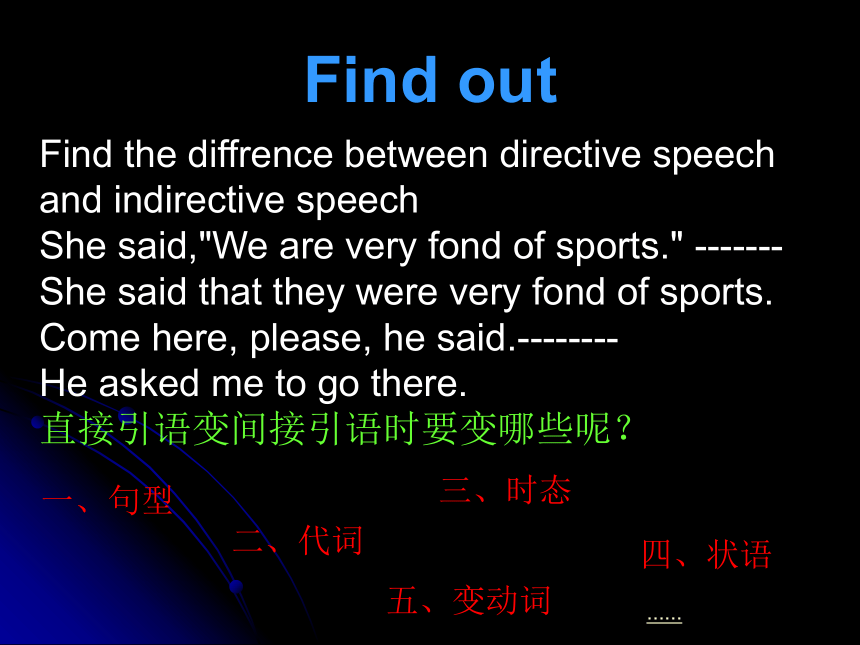
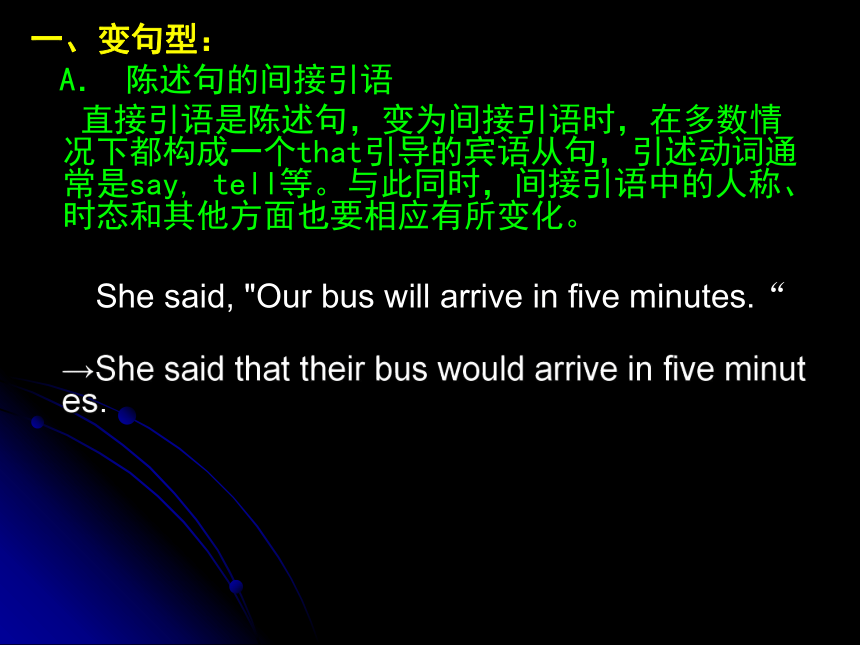
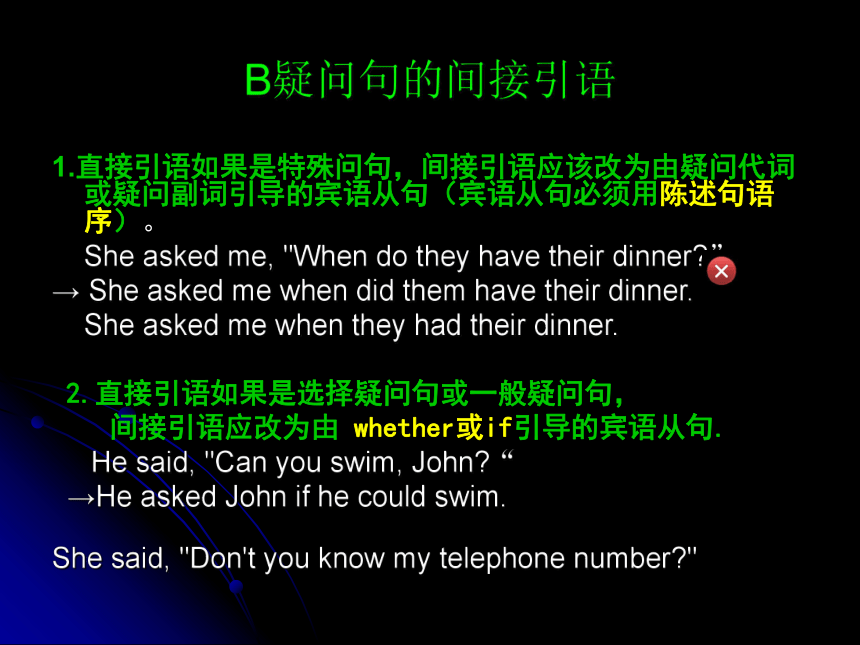
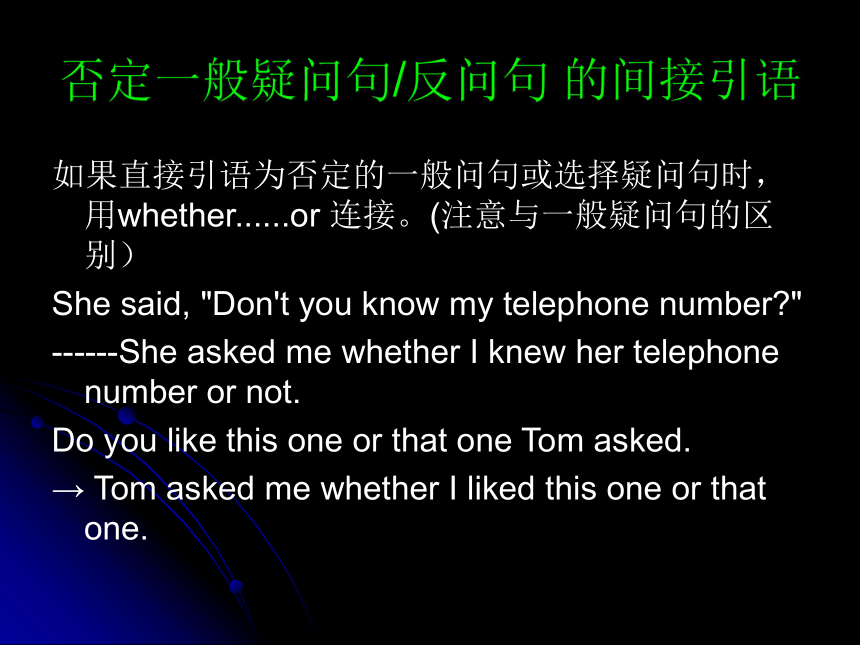
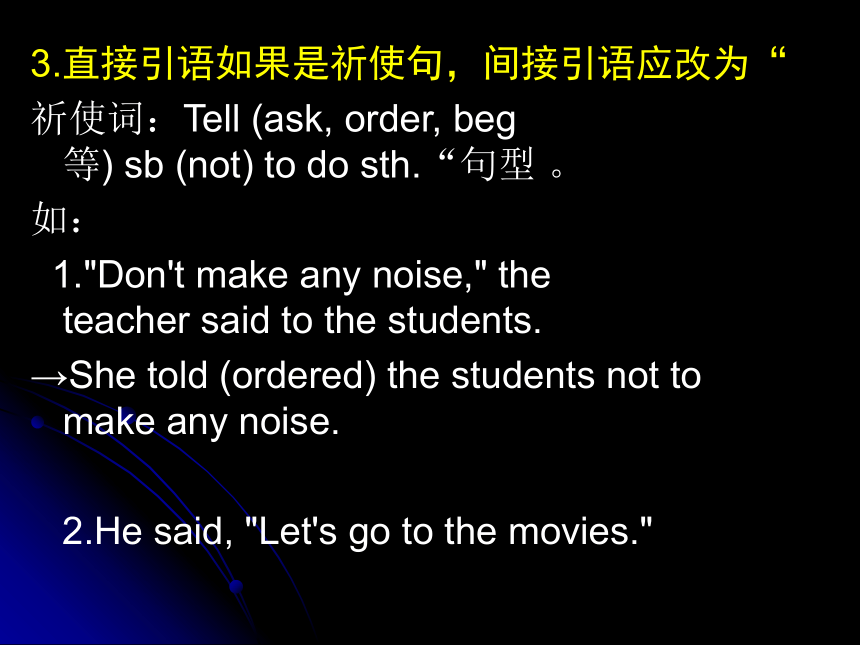
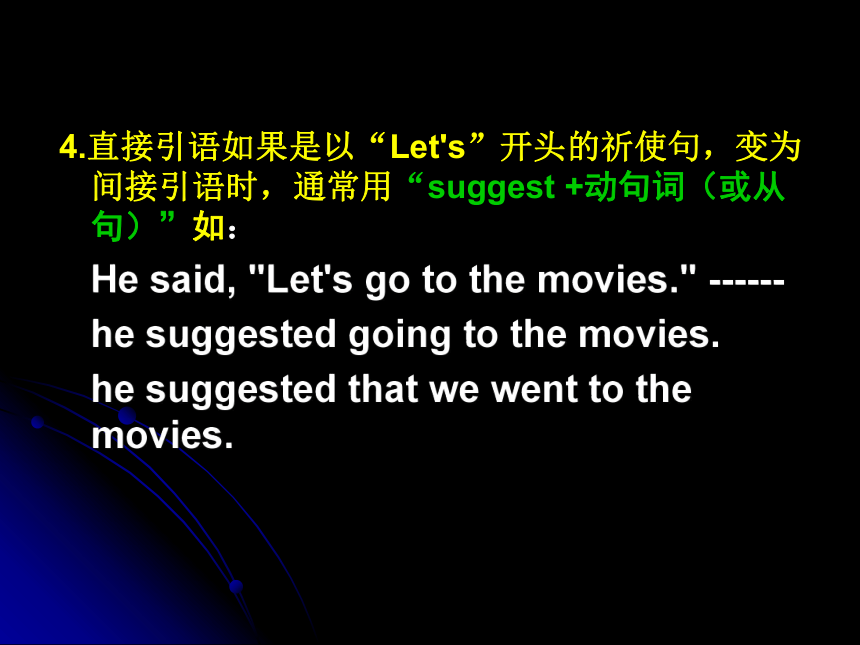
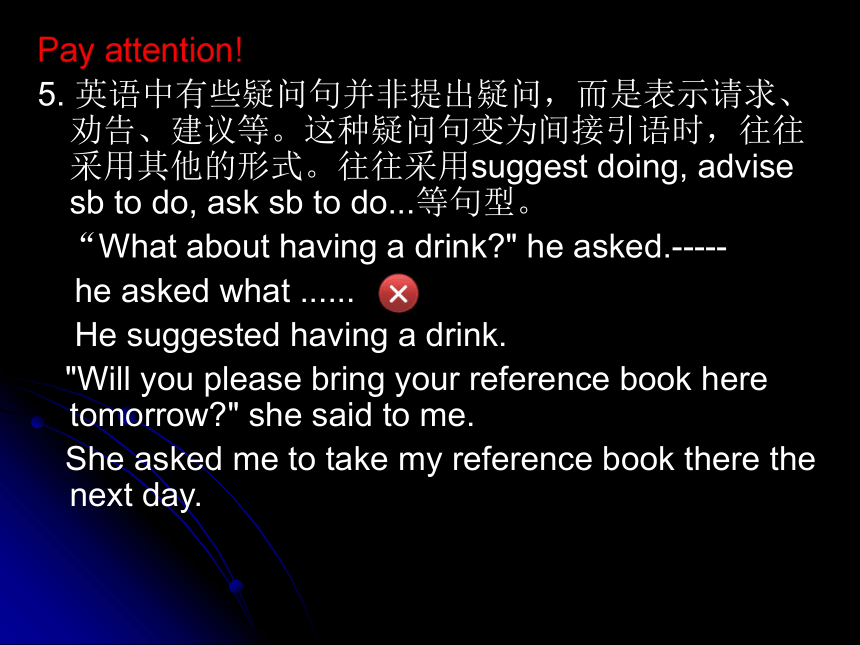
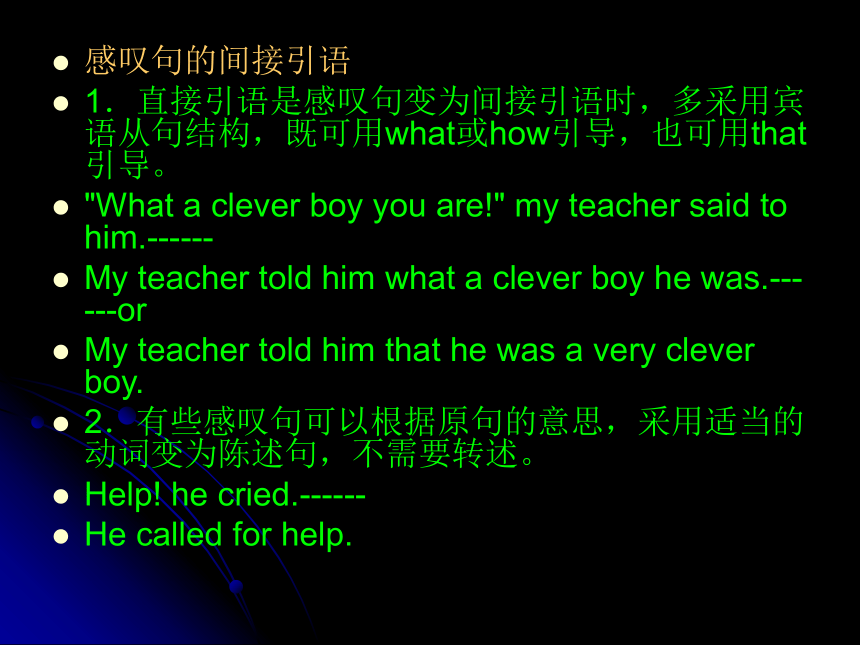
文档简介
(共24张PPT)
直接引语与间接引语
引述某人的话一般采用两种形式:一种是直接引语(Directive Speech),即原封不动地引用原话,把它放在引号内;另一种是间接引语(Indirective Speech),即用自己的话加以转述,被转述的内容不放在引号内。
he said, "I love dogs."-----Directive Speech
he said that he loved dogs.------Indirective Speech
Find out
Find the diffrence between directive speech and indirective speech
She said,"We are very fond of sports." -------
She said that they were very fond of sports.
Come here, please, he said.--------
He asked me to go there.
直接引语变间接引语时要变哪些呢?
一、句型
二、代词
三、时态
四、状语
五、变动词
......
一、变句型:
A. 陈述句的间接引语
直接引语是陈述句,变为间接引语时,在多数情况下都构成一个that引导的宾语从句,引述动词通常是say, tell等。与此同时,间接引语中的人称、时态和其他方面也要相应有所变化。
She said, "Our bus will arrive in five minutes.“
→She said that their bus would arrive in five minutes.
B疑问句的间接引语
1.直接引语如果是特殊问句,间接引语应该改为由疑问代词或疑问副词引导的宾语从句(宾语从句必须用陈述句语序)。
She asked me, "When do they have their dinner ”
→ She asked me when did them have their dinner.
She asked me when they had their dinner.
2.直接引语如果是选择疑问句或一般疑问句,
间接引语应改为由 whether或if引导的宾语从句.
He said, "Can you swim, John “
→He asked John if he could swim.
She said, "Don't you know my telephone number "
否定一般疑问句/反问句 的间接引语
如果直接引语为否定的一般问句或选择疑问句时,用whether......or 连接。(注意与一般疑问句的区别)
She said, "Don't you know my telephone number "
------She asked me whether I knew her telephone number or not.
Do you like this one or that one Tom asked.
→ Tom asked me whether I liked this one or that one.
3.直接引语如果是祈使句,间接引语应改为“
祈使词:Tell (ask, order, beg等) sb (not) to do sth.“句型 。
如:
1."Don't make any noise," the teacher said to the students.
→She told (ordered) the students not to make any noise.
2.He said, "Let's go to the movies."
4.直接引语如果是以“Let's”开头的祈使句,变为间接引语时,通常用“suggest +动句词(或从句)”如:
He said, "Let's go to the movies." ------
he suggested going to the movies.
he suggested that we went to the movies.
Pay attention!
5. 英语中有些疑问句并非提出疑问,而是表示请求、劝告、建议等。这种疑问句变为间接引语时,往往采用其他的形式。往往采用suggest doing, advise sb to do, ask sb to do...等句型。
“What about having a drink " he asked.-----
he asked what ......
He suggested having a drink.
"Will you please bring your reference book here tomorrow " she said to me.
She asked me to take my reference book there the next day.
感叹句的间接引语
1.直接引语是感叹句变为间接引语时,多采用宾语从句结构,既可用what或how引导,也可用that引导。
"What a clever boy you are!" my teacher said to him.------
My teacher told him what a clever boy he was.------or
My teacher told him that he was a very clever boy.
2.有些感叹句可以根据原句的意思,采用适当的动词变为陈述句,不需要转述。
Help! he cried.------
He called for help.
二、变代词 A、如何变人称:
①最简单的情况,当主句的主语是第一人称时,引语中的人称代词不变。
I said, You did quite well in the exam. → I said that you had done quite well in the exam.
那么当主句的主语不是第一人称时呢?
口诀:一随主。二随宾,第三人称不更新。
“一随主”是指在直接引语变间接引语时,如果从句中的主语是第一人称或被第一人称所修饰。从句中的人称要按照主句中主语的人称变化如:
She said. "My brother wants to go shopping with me. ”
→She said her brother wanted to go shopping with her.
“二随宾”是指直接引语变间接引语时,若从句中的主语是第二人称或被第二人所修饰。从句中的人称要跟引号外的主句的宾语一致。如果引号外的主句没有宾语。也可以用第一人称,如:
He said to Kate, "how is your sister "
He asked Kate how her sister was.
提示:如果主句中无宾语,应根据语境或想象,自添适当的宾语;
Mother asked, "Where have you been "
→ Moher asked me where I had been.
如果主句中无宾语而直接引语中有宾语,则将其改为间接引语的宾语。
“Why are you late again, John?” the teacher asked. → The teacher asked John why he was late again. 老师问约翰为什么他又迟到。
“第三人称不更新”是指直接引语变间接引语时。如果从句中的主语是第三人称或被第三人称所修饰,从句中的人称一般不需要变化如:
Mr Smith said,"Jack is a good boy.“
→Mr Smith said Jack was a good boy.
B.指示代词的变化
“I bought these flowers for you”, Jane said. ------Jane said that she had bought those flowers for me.
“I grow these tomatoes myself”, he said. → He said that he grew those tomatoes himself.
直接引语中的指示代词 this these
间接引语中的指示代词 that those
注:要具体结合语境
三、变时态
直接引语在改为间接引语时、时态需要做相应的调整。
①现在时间推移到过去时间
直接引语中的时态 间接引语中的时态
一般现在时 一般过去时
现在进行时 过去进行时
现在完成时 过去完成时
The old man said, I have lived in this street since 1960.
→The old man said that he had lived in that street since 1960.
He said, Is it raining
→ He asked if it was raining.
②过去时间尽量推移到过去的过去
直接引语中的时态 间接引语中的时态
一般过去时 过去完成时
过去完成时 过去完成时
过去进行时 过去进行时
She said to me, “I wrote a letter to my parents.”
→She told me that she had written a letter to her parents.
“What were you doing at seven p.m. yesterday " he asked
→ He asked me what I was doing at seven p.m. the day before.
将来时间推移到过去将来时间
直接引语中的时态 间接引语中的时态
一般将来时 过去将来时
“We are going to meet at the school gate,” she said to me.--------
She told me that they were going to meet at the school gate.
规则之外还有特例!
注意:以下几种情况时态 不变
①直接引语是客观真理。
The teacher said "The earth moves around the sun .”
→ The teacher said that the earth moves around
the sun earth.
③直接引语中有具体的过去某年、某月、某日作状语,
变为间接引语时,时态不变。如:
Jack said. "I was born on April 2l, 1980." →Jack said he was born on April 21, 1980.
④直接引语如果是一般现在时。表示一种反复出现或习惯性的动作,或动作,状态仍在进行中,变间接引语,时态可不变。如:
He said, “I get up at six every morning。” →He said he gets up at six every morning.
Just now Brown said, My son is ill today.
→ Brown told me just now that his son is ill today.
⑤如果直接引语中的情态动词没有过去时的形式不再变
(例:could, should, would, might)
The doctor said, “You should stay in bed for 2 days.”
→ The doctor said I should stay in bed for 2 days.”
和已经是过去时的形式时,
例: ought to, had better, used to
Peter said. "You had better come here today." →Peter said I had better go there that day.
四、变状语:
直接引语变间接引语,状语变化有其内在规律,
1..时间状语由“现在”改为“原来”
He said, ”I want to go swimming now. ”
→He said he wanted to go swimming then.
He said, I spoke to them yesterday.
He said that he had spoken to them the day before.
The student said,“We have learned about 3,000 English words so far”.------
The student said that they had learned about 3,000 English words by then.
now-----then today----that day
tonight-------that night this week-----that week
yesterday------the day before
the day before testerday------two days before
tomorrow---- the next day so far-----by then
2.地点状语的变化 当直接引语变间引语时,地点状语here通常变为there。但如果说话人所在地点就是引述人所在地点,那么仍然使用here.
Come here, please, he said.
→ He asked me to come here.
他叫我到这里来。(引述人地点不变)
→ He asked me to go there.
他叫我到那里去。(引述人地点发生变化)
五、变动词
he said to me,"I don't like our English teacher."
He told me that he did not like our English teacher.
He said, "Can you swim, John “
He asked John if he could swim.
But
第六变?好好观察下...
he said to me,"I don't like our English teacher."
He told me that he did not like our English teacher.
He said, "Can you swim, John “
He asked John if he could swim.
变 符号
引号----去掉 问好-----句号
直接引语与间接引语
引述某人的话一般采用两种形式:一种是直接引语(Directive Speech),即原封不动地引用原话,把它放在引号内;另一种是间接引语(Indirective Speech),即用自己的话加以转述,被转述的内容不放在引号内。
he said, "I love dogs."-----Directive Speech
he said that he loved dogs.------Indirective Speech
Find out
Find the diffrence between directive speech and indirective speech
She said,"We are very fond of sports." -------
She said that they were very fond of sports.
Come here, please, he said.--------
He asked me to go there.
直接引语变间接引语时要变哪些呢?
一、句型
二、代词
三、时态
四、状语
五、变动词
......
一、变句型:
A. 陈述句的间接引语
直接引语是陈述句,变为间接引语时,在多数情况下都构成一个that引导的宾语从句,引述动词通常是say, tell等。与此同时,间接引语中的人称、时态和其他方面也要相应有所变化。
She said, "Our bus will arrive in five minutes.“
→She said that their bus would arrive in five minutes.
B疑问句的间接引语
1.直接引语如果是特殊问句,间接引语应该改为由疑问代词或疑问副词引导的宾语从句(宾语从句必须用陈述句语序)。
She asked me, "When do they have their dinner ”
→ She asked me when did them have their dinner.
She asked me when they had their dinner.
2.直接引语如果是选择疑问句或一般疑问句,
间接引语应改为由 whether或if引导的宾语从句.
He said, "Can you swim, John “
→He asked John if he could swim.
She said, "Don't you know my telephone number "
否定一般疑问句/反问句 的间接引语
如果直接引语为否定的一般问句或选择疑问句时,用whether......or 连接。(注意与一般疑问句的区别)
She said, "Don't you know my telephone number "
------She asked me whether I knew her telephone number or not.
Do you like this one or that one Tom asked.
→ Tom asked me whether I liked this one or that one.
3.直接引语如果是祈使句,间接引语应改为“
祈使词:Tell (ask, order, beg等) sb (not) to do sth.“句型 。
如:
1."Don't make any noise," the teacher said to the students.
→She told (ordered) the students not to make any noise.
2.He said, "Let's go to the movies."
4.直接引语如果是以“Let's”开头的祈使句,变为间接引语时,通常用“suggest +动句词(或从句)”如:
He said, "Let's go to the movies." ------
he suggested going to the movies.
he suggested that we went to the movies.
Pay attention!
5. 英语中有些疑问句并非提出疑问,而是表示请求、劝告、建议等。这种疑问句变为间接引语时,往往采用其他的形式。往往采用suggest doing, advise sb to do, ask sb to do...等句型。
“What about having a drink " he asked.-----
he asked what ......
He suggested having a drink.
"Will you please bring your reference book here tomorrow " she said to me.
She asked me to take my reference book there the next day.
感叹句的间接引语
1.直接引语是感叹句变为间接引语时,多采用宾语从句结构,既可用what或how引导,也可用that引导。
"What a clever boy you are!" my teacher said to him.------
My teacher told him what a clever boy he was.------or
My teacher told him that he was a very clever boy.
2.有些感叹句可以根据原句的意思,采用适当的动词变为陈述句,不需要转述。
Help! he cried.------
He called for help.
二、变代词 A、如何变人称:
①最简单的情况,当主句的主语是第一人称时,引语中的人称代词不变。
I said, You did quite well in the exam. → I said that you had done quite well in the exam.
那么当主句的主语不是第一人称时呢?
口诀:一随主。二随宾,第三人称不更新。
“一随主”是指在直接引语变间接引语时,如果从句中的主语是第一人称或被第一人称所修饰。从句中的人称要按照主句中主语的人称变化如:
She said. "My brother wants to go shopping with me. ”
→She said her brother wanted to go shopping with her.
“二随宾”是指直接引语变间接引语时,若从句中的主语是第二人称或被第二人所修饰。从句中的人称要跟引号外的主句的宾语一致。如果引号外的主句没有宾语。也可以用第一人称,如:
He said to Kate, "how is your sister "
He asked Kate how her sister was.
提示:如果主句中无宾语,应根据语境或想象,自添适当的宾语;
Mother asked, "Where have you been "
→ Moher asked me where I had been.
如果主句中无宾语而直接引语中有宾语,则将其改为间接引语的宾语。
“Why are you late again, John?” the teacher asked. → The teacher asked John why he was late again. 老师问约翰为什么他又迟到。
“第三人称不更新”是指直接引语变间接引语时。如果从句中的主语是第三人称或被第三人称所修饰,从句中的人称一般不需要变化如:
Mr Smith said,"Jack is a good boy.“
→Mr Smith said Jack was a good boy.
B.指示代词的变化
“I bought these flowers for you”, Jane said. ------Jane said that she had bought those flowers for me.
“I grow these tomatoes myself”, he said. → He said that he grew those tomatoes himself.
直接引语中的指示代词 this these
间接引语中的指示代词 that those
注:要具体结合语境
三、变时态
直接引语在改为间接引语时、时态需要做相应的调整。
①现在时间推移到过去时间
直接引语中的时态 间接引语中的时态
一般现在时 一般过去时
现在进行时 过去进行时
现在完成时 过去完成时
The old man said, I have lived in this street since 1960.
→The old man said that he had lived in that street since 1960.
He said, Is it raining
→ He asked if it was raining.
②过去时间尽量推移到过去的过去
直接引语中的时态 间接引语中的时态
一般过去时 过去完成时
过去完成时 过去完成时
过去进行时 过去进行时
She said to me, “I wrote a letter to my parents.”
→She told me that she had written a letter to her parents.
“What were you doing at seven p.m. yesterday " he asked
→ He asked me what I was doing at seven p.m. the day before.
将来时间推移到过去将来时间
直接引语中的时态 间接引语中的时态
一般将来时 过去将来时
“We are going to meet at the school gate,” she said to me.--------
She told me that they were going to meet at the school gate.
规则之外还有特例!
注意:以下几种情况时态 不变
①直接引语是客观真理。
The teacher said "The earth moves around the sun .”
→ The teacher said that the earth moves around
the sun earth.
③直接引语中有具体的过去某年、某月、某日作状语,
变为间接引语时,时态不变。如:
Jack said. "I was born on April 2l, 1980." →Jack said he was born on April 21, 1980.
④直接引语如果是一般现在时。表示一种反复出现或习惯性的动作,或动作,状态仍在进行中,变间接引语,时态可不变。如:
He said, “I get up at six every morning。” →He said he gets up at six every morning.
Just now Brown said, My son is ill today.
→ Brown told me just now that his son is ill today.
⑤如果直接引语中的情态动词没有过去时的形式不再变
(例:could, should, would, might)
The doctor said, “You should stay in bed for 2 days.”
→ The doctor said I should stay in bed for 2 days.”
和已经是过去时的形式时,
例: ought to, had better, used to
Peter said. "You had better come here today." →Peter said I had better go there that day.
四、变状语:
直接引语变间接引语,状语变化有其内在规律,
1..时间状语由“现在”改为“原来”
He said, ”I want to go swimming now. ”
→He said he wanted to go swimming then.
He said, I spoke to them yesterday.
He said that he had spoken to them the day before.
The student said,“We have learned about 3,000 English words so far”.------
The student said that they had learned about 3,000 English words by then.
now-----then today----that day
tonight-------that night this week-----that week
yesterday------the day before
the day before testerday------two days before
tomorrow---- the next day so far-----by then
2.地点状语的变化 当直接引语变间引语时,地点状语here通常变为there。但如果说话人所在地点就是引述人所在地点,那么仍然使用here.
Come here, please, he said.
→ He asked me to come here.
他叫我到这里来。(引述人地点不变)
→ He asked me to go there.
他叫我到那里去。(引述人地点发生变化)
五、变动词
he said to me,"I don't like our English teacher."
He told me that he did not like our English teacher.
He said, "Can you swim, John “
He asked John if he could swim.
But
第六变?好好观察下...
he said to me,"I don't like our English teacher."
He told me that he did not like our English teacher.
He said, "Can you swim, John “
He asked John if he could swim.
变 符号
引号----去掉 问好-----句号
